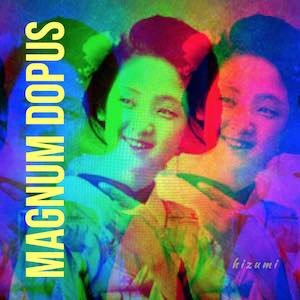
Memphis DIY alt. rock duo Magnum Dopus recently dropped the sizzling, 11-track album, Hizumi (which means either rice plant or flower or princess in Japanese depending on a number of factors).
Hizumi was recorded by guitarist, George Cole, and vocalist, Andrew McCarty, under the duo’s moniker, Magnum Dopus.
The album opens with the rolling and rocking of “Control Me,” starting and stopping melodic riffs, the deep vocals of McCarty and a fine guitar solo from Cole.
“Live Love Lose” has a kicking guitar rhythm similar to the opener, but McCarty’s vocals are more forceful. LLL sounds a lot like the post-punk era of the early 1980s for the 80s enthusiasts among you. As the album rolls on, it becomes clear that the duo is influenced by the post-punk genre and that era in rock history between the decline of punk and the emergence of new wave.
The lead single, “Black Boxx,” on Hizumi is a strutting, strapping number with jangling guitars and a heavy bass line. McCarty’s vocals meld nicely with the various tempo changes.
“Like many of the other songs on the record,” says McCarty, “it’s about heartbreak and reflecting on a previous relationship; musically, it’s a bit like Interpol meets Talking Heads.”
Things slow down on the next track, “Crashing Down,” but it’s a bit too demo-sounding. However, the second half of the song improves as it takes on a true chugging vibe. Still the song suffers a bit from an identity crisis. Following that, the duo turned to a punk-pop sound on “Departure,” which portends a type of dark foreboding.
One of the album’s most powerful numbers is “Get Over It,” a dreamy, lo-fi pop track with a smooth vibe and discotheque beat.
The track is also one of the most memorable songs on the L.P. McCarty’s vocals (for the most part) seem much better suited for a song like this. That may be because the other instruments are not drowning out his vocals as with other songs. It also seems better mixed and mastered as well.
“‘Get Over It’ is our ode to disco,” McCarty remarks. “While there was a bit of Daft Punk influence musically, the song quickly became it’s own thing and a little rougher around the edges and rockier. The original idea was to write a song that would make people dance at our shows.”
This would have been the single we picked for the album, not only because it’s a decent track, but perhaps the most accessible to a wider audience.
Another standout track on the album – which also nicely highlights McCarty’s writing/singing and Cole’s guitar playing – is “Headlights.” It is the duo’s stripped-down, more basic songs that often work the best.
“Headlights” is a straight-up pop song that ponders what could’ve been in a relationship. Sturgis Nikides (Low Society) played banjo and slide guitar and Lisa Mac sang backup.
Some folks might also dig the retro-flavor of “80s Girl” but it feels a bit unfinished. The album closes with the roaring post-punk-influenced track, “Hai,” featuring a ‘hey-hey’ chorus and what sounds like people talking on the radio. Cole digs in at the ending of the track with one of his finest guitar jams.
The duo got together a few years ago after leaving their previous bands. “Once our previous band fell apart,” McCarty says, “we re-constructed the music and lyrics and it became the first Magnum Dopus album.”
For some, the duo’s range of styles and sounds through the 11 tracks may be a bit irregular and disorienting, but overall, it’s a strong lo-fi rock album.
“To flesh out the sound, Andrew also recorded bass and drum parts. Since the band didn’t exist at the time of recording, we didn’t have a particular sound we were going for, so the album is a bit of a hodgepodge of sound.”
An experienced rock producer who knows how to bring out the best in their truest sounds (together with some fine mastering) could really help boosts many of the tracks.
There are a number of songs that miss the mark (“One Sunday Too Far”; “Crashing Down”) and could have been left off to make the album stronger, but in the end, that doesn’t overshadow a solid rock album.
https://www.magnumdopus.com
